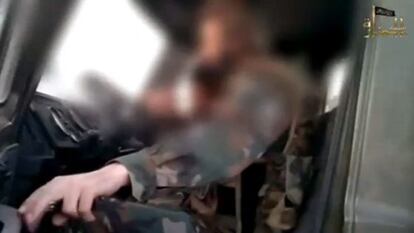Interior Ministry pins massacre of 130 in Syria on Ceuta taxi driver
Government distributes video of suicide bomber after Al Qaeda network is busted


Rachid Wahbi looked at the camera and smiled. He hugged two colleagues, thanked Allah and climbed in the truck. He was wearing khaki fatigues and a black turban, and he held a Kalashnikov in his hands. The camera focused on the truck as it rolled away. Seconds later, a tremendous explosion was heard, and the shaking camera captured a dark cloud rising up to the heavens.
Before leaving this world forever, the 33-year-old taxi driver who only weeks earlier had been steering his old white Mercedes through the streets of Ceuta explained his reasons in front of the camera: he was doing this for the jihad, for Allah, and against the enemy Bashar al-Assad.
Thousands of kilometers away, in the 90-square-meter family apartment in the low-income Ceuta neighborhood of El Príncipe Felipe, his wife Sanaa awaited news from him. He had told their four- and six-year-old children that he had bought them presents on his journey.
That was a year ago. Now, the Interior Ministry is saying that Rachid’s suicide attack against a military barracks in Idlib, Syria, caused 130 deaths. The video was uploaded last week on the ministry’s website, coinciding with a press conference by Minister Jorge Fernández Díaz to announce the dismantling in Ceuta of the Al Qaeda network that enlisted Rachid and 11 other young men from the Spanish exclave in North Africa. In the last year, all of them traveled to Syria to fight against the Assad regime.
My husband was an exemplary man — I am proud of him”
Until now, security forces had refrained from releasing the video to prevent other young men from finding inspiration for similar attacks. Several high-ranking officials in the anti-terrorist fight expressed surprise at seeing footage of this tribute to jihad on an official website.
A few days after Rachid’s death, his 25-year-old widow — tall, slim and wearing white as a sign of mourning — told EL PAÍS how she had found out about it: “Mustafá called me on the phone and told me: Rachid is dead. He didn’t give me any other details so as not to make me suffer any more. He told me he had been buried following the Muslim rites.”
“He did not kill himself,” she stated at the time. “I don’t know how he died or where. His friend didn’t give me any details. How could he kill himself in front of his friends?” But weeks later, when Al Qaeda sympathizers circulated the video, boasting that this attack had caused “many enemy casualties,” Sanaa recognized her husband. His voice and his image, though blurry, were unmistakable.
“He died on June 1. His friend Mustafá called me and I was in shock. He was in Syria just a few days. Maybe not even a week. During the trip, which lasted six weeks, he would communicate with us through Messenger. They were in Turkey for quite a while, apparently because they were unable to get into Damascus. When they made it to Syria he phoned us, but did not give us details of what they were up to. He didn’t talk about himself; he only asked about me and the kids. I told him to come back, that it was dangerous. My husband was an exemplary man — I am proud of him.”
Why did he travel to Syria? “When he saw the news about Syria on TV, he was really affected. ‘Will nobody do anything for the Muslims?’ he would ask. I wondered the same occasionally. It made you feel like doing something. But what can you do. He felt rage and powerlessness. When he saw the torture of children by Assad’s military, he felt like crying. That touched his heart. He was very sensitive. But I never imagined he would go.”
Rachid’s friends met the same fate. Mustafá Mohammed, aka Piti, was 30, married and a father of two. Mustafá Mohamed, known as “Tafo,” was 24 and his wife was pregnant. They all had families of their own. They all left without providing any explanations. All three were enlisted in Ceuta by an Al Qaeda network that was dismantled after eight people, all Spanish nationals, were arrested. For a year now, the residents of El Príncipe and El Sardinero, where most of them lived, have been dealing with this trickle of pain and death. This shantytown of thousands of illegal dwellings and record unemployment and dropout rates is home to 12,000 people, nearly all Muslims.
Tu suscripción se está usando en otro dispositivo
¿Quieres añadir otro usuario a tu suscripción?
Si continúas leyendo en este dispositivo, no se podrá leer en el otro.
FlechaTu suscripción se está usando en otro dispositivo y solo puedes acceder a EL PAÍS desde un dispositivo a la vez.
Si quieres compartir tu cuenta, cambia tu suscripción a la modalidad Premium, así podrás añadir otro usuario. Cada uno accederá con su propia cuenta de email, lo que os permitirá personalizar vuestra experiencia en EL PAÍS.
¿Tienes una suscripción de empresa? Accede aquí para contratar más cuentas.
En el caso de no saber quién está usando tu cuenta, te recomendamos cambiar tu contraseña aquí.
Si decides continuar compartiendo tu cuenta, este mensaje se mostrará en tu dispositivo y en el de la otra persona que está usando tu cuenta de forma indefinida, afectando a tu experiencia de lectura. Puedes consultar aquí los términos y condiciones de la suscripción digital.








































